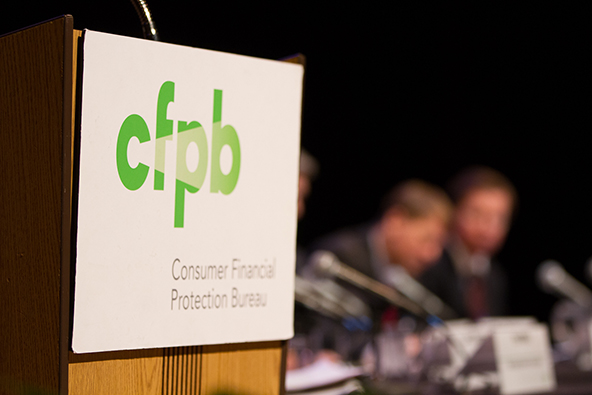On the CFPB, Debt Collection and Credit Worthiness

In two separate bulletins, the Consumer Financial Protection Bureau (CFPB) has put debt collectors on notice about their debt collection practices. In the first one, the CFPB reminds third-party debt collectors that under the Fair Debt Collection Practices Act (FDCPA) it is illegal to “harass, oppress, or abuse any person”, to “use false, deceptive or misleading representation” or to use “use any unfair or unconscionable means” in connection with the collection of a debt. Additionally, credit card issuers are informed that, even as their own activities do not come within the FDCPA’s remit, committing unfair, deceptive, or abusive acts or practices nevertheless violates the Dodd-Frank Act. So the CFPB is telling debt collectors that it is watching them (and lawsuits are expected to follow).
But it was the other bulletin that grabbed my attention. In it, the consumer watchdog discusses the linkage between credit card collection accounts, as reported in consumer credit files, and credit scores and casts doubt on the existence of a strong causal relationship between the two. Then the CFPB goes on to accuse debt collectors who do make claims that a paid collection account does indeed improve a debtor’s creditworthiness of deception. Well, the CFPB is wrong, of course, but the really sad thing is that the watchdog is doing a huge amount of harm to the very people it is supposed to protect. Let me explain.
Effects on Credit Reports
In the bulletin, the CFPB makes a distinction between “obsolete” and “non-obsolete” debt. The first category includes debt that is too old to be included in a person’s credit file, which typically reflects financial activity for the past seven years. That is mostly true, although the reporting of court judgments is subject to different rules, which can significantly extend the period. But it is the other category, which is both more important and more interesting. Here is what the CFPB has to say about it:
Another example of a potentially deceptive claim involves representations that debt owners and third-party debt collectors may make about non-obsolete debts. Payments on debts in collection will change credit reports only if debt owners or third-party debt collectors furnish information about the payments to credit reporting agencies and the agencies add the information to credit files and credit reports. If debt owners or third-party debt collectors do not furnish payment information to credit reporting agencies, then it may well be deceptive for them to make representations about how debt payments will be reflected on a consumer’s credit report.
That is incorrect. Note that if, having reported a charged-off account to the credit bureaus, the loan originator has then sold it to a third party, the originator no longer has any knowledge of any subsequent account activity. However, the new owner of the debt also cannot report any account activity (negative or positive) to the credit bureaus, because it is not the entity which made the original report and a debt can only be reported by one creditor, irrespective of how many times it was resold. Instead, whenever a collection account is settled, the debt collector issues a “paid in full” letter (irrespective of the actual settlement amount), which the debtor needs to forward to the three national credit bureaus — TransUnion, Equifax and Experian. Upon receiving the letter, the credit agencies must update the debtor’s credit file to show the collection account as paid and to remove it from the group of “negative accounts”. If they fail to do so within a month, the bureaus are required to delete the entry altogether.
Effects on Credit Scores and Credit Worthiness
But the bigger issue here is the relationship between collection accounts and credit scores and credit worthiness. Here is what the CFPB has to say on the relationship between the first two items:
Even assuming that debt owners and third-party collectors report payments on debts in collection to consumer reporting agencies, in light of the numerous factors that influence an individual consumer’s credit score, such payments may not improve the credit score of the consumer to whom the representation is being made. Consequently, debt owners or third-party debt collectors may well deceive consumers if they make representations that paying debts in collection will improve a consumer’s credit score.
OK, that is very wrong. Yes, there are many factors that determine a consumer’s credit score, but a collection account weighs heavily on the end result. The question is not whether there is any causal relationship, but how strong it is. If a consumer had, say, a dozen negative entries in her credit file, then settling only one of them would improve her credit score only marginally, but there would be an improvement. If, on the other hand, a consumer had only one derogatory account on file, settling it would lead to a much greater improvement.
The same mechanism applies to measuring credit worthiness and this is where the CFPB gets it really, really wrong. Here is what the bureau has to say on the matter:
Potential lenders may use a variety of sources of information to assess the creditworthiness of prospective borrowers, including credit report or credit score information. Even where they use the same information, potential lenders may assign different weight to information in evaluating the creditworthiness of prospective borrowers. The nature and extent of the impact of a payment on a particular debt in collection to a prospective borrower’s creditworthiness may depend on all of the information potential lenders consider and how they weigh that information, factors that debt owners or third-party debt collectors often will not know. Debt owners or third-party debt collectors may well deceive consumers if they make representations about the nature or extent of improved creditworthiness that result from paying debts in collection.
As anyone with a debt collection account on file who has ever applied for, say, a mortgage would tell the CFPB, having that single account automatically disqualifies an applicant. In order for the application to be initiated, the collection account must first be settled. Needless to say, having multiple derogatory entries makes a loan applicant even less creditworthy. In fact, becoming eligible for new credit is by far the biggest incentive for consumers to clean up their credit history. So we are not talking about some hypothetical scenarios here. Collection accounts have real-life impact on consumers’ chances for getting new loans, which is to say on their creditworthiness.
The Takeaway
So the CFPB has done a lot of damage by releasing this bulletin. Leaving aside any moral considerations for keeping one’s commitments, consumers may well get the message that paying off their charged-off credit card accounts is unnecessary and has little or no effect on their future loan prospects. But if that is the case, perhaps one could also get away with not paying back another credit card, and a third… Where does it all end? No, this makes no sense at all.
Image credit: Flickr / Consumer Financial Protection Bureau.


